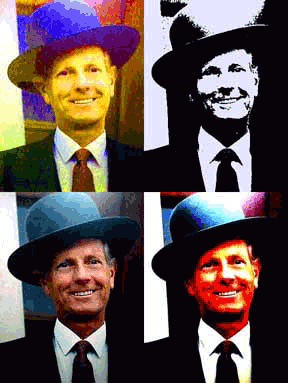Richard Kane Biography
Richard Kane was born in Bartlesville, Oklahoma, on October 15, 1917, son of John Henry Kane and Louise Miller Kane.
His paternal grandfather, James R. Kane, served as First Sergeant in a Pennsylvania regiment in the Civil War. After the war he homesteaded on land in Western Kansas. He established a successful farm and ranch operation there and served several years as County Treasurer.
His maternal grandfather, M. G. Miller, moved with a group of settlers from Michigan and Indiana to Olathe, Kansas Territory, before the Civil War with the purpose of bringing Kansas Territory into the Union as a Free State. He prospered there as the owner of bank, the telephone company, and several farms.
His father, John Henry Kane, taught a year in a one room rural school after graduating from Greensburg, Kansas, High School before attending college. After two years of college, he returned to his home town, teaching in the high school for one year and serving as principal of the high school for one year. He then attended the University of Kansas, receiving his Bachelor of Arts Degree in 1899, and Law Degree in 1900. He came here in 1904 while this was still Indian Territory after a friend suggested that the oil activity would provide good opportunities for a young lawyer. He established an active practice with many of the successful early day oil operators as his clients. In 1907 he was elected the first County Attorney of Washington County after statehood. In 1917 he was the lawyr incorporating Phillips Petroleum Company. He served as General Counsel and was Executive Vice President of the Company when he retired.
His mother, Louise Miller Kane, graduated from Vassar College in New York, married John H. Kane in 1907, and was active in cultural and civic organizations during her lifetime.
Richard Kane was born in the house which still stands at 925 Cherokee in Bartleville. He moved with his parents to the house on Kane Hill in 1931. He attended Garfield Elementaryt School which was located on Cherokee Avenue between Sixth Street and Adams Boulevard, where the Community Center now stands. He attended sixth grade through twelfth grade in what was then Bartlesville Junior Senior High School and is now Central Middle School. He graduated in 1935.
He attended the University of Kansas and graduated in 1939. He was President of Beta Theta Pi Fraternity, Cadet Commander of the ROTC, and on the Dean's Honor Roll at graduation. He attended the University of Michigan Law School starting in the fall of 1939 with the Class of 1942. After two years, his schooling was interrupted by World War II, and he returned afterwards to graduate with a Juris Doctor Degree in 1946. In the meantime, he petitioned the Supreme Court, was granted permission, took and passed the Oklahoma State Bar Examination and was admitted to the practice of law in Oklahoma in 1941.
Being commissioned as a Second Lieutenant after ROTC and graduation from the University of Kansas in 1939, he was called to active service in July, 1941. He was stationed at Camp Wallace near Galveston, Texas, during which time he attended and graduated from the Adjutant General School at Fort Washington, on the Potomac River south of Washington, D.C. He then served at Fort George G. Meade near Laurel, Maryland, during which time he attended and graduated from the Command and General Staff School at Fort Leavenworth, Kansas. He finished his fifty-five months of service at the headquarters of the Mid Pacific Base Command at Fort Ruger, near Honolulu, Hawaii. He ended his service with the rank of Major.
Richard Kane and Mary Muder were married in Bartlesville on July 27, 1940. They had known each other since grade school. During law school and army service they lived in Ann Arbor and Willow Run, Michigan, Galveston and LaMarque, Texas, Laurel, Maryland, and Washington, D.C. They returned to Bartlesville in 1946. Mary was able to follow him all through Law School and army times, except during his service in Hawaii. They had four children, Robert Muder Kane, born in Galveston, Texas in 1942, Louise Kane (now Roark) born in 1943, Ann Kane (now Seidman), born in 1947, and Mark Kane, born in 1953. The last three were born in Oklahoma. There are many grandchildren. In 1953, Richard moved with his family back into the house on Kane Hill, and he lived there for over 50 years.
Richard Kane started his general law practice in Bartlesville, Oklahoma, in 1946, and retired from the practice of law in 2000. In addition to his law practice, Richard owned and operated a cattle operation (Redbird Ranch), the Kane family farm and ranch in Kiowa County, Kansas, and other farm and urban properties in and around Bartlesville. He engaged in the oil and gas business as operator and royalty owner. He had interests in banking and other businesses and investments.
Starting in 1947, he served as Attorney for the Bartlesville Public Schools for almost fifty years, sitting on the Board of Education meetings with voice but no vote. The years following World War II were ones of rapid growth for Bartlesville and the Public Schools. New school buildings were built east of the Caney River and the school buildings west of the river needed additional classroom, cafeterias, and all-purpose rooms. It was largely because of those many years of service to the schools, without pay except for the handling of bond issues, that the school board decided to name this school, built in 1985, the Richard Kane Elementary School.
He served as Attorney for numerous charitable and character building organizations. He was Attorney for the local hospital during which time the Washington County Memorial Hospital was merged with the Jane Phillips Episcopal Hospital. On the state level, he was appointed and served as a Special Judge on the Oklahoma Supreme Court to replace one of the judges who excused himself from a case.

On the local level, Mr. Kane was active in many organizations. He served as President of Rotary, Chamber of Commerce, YMCA, Salvation Army Advisory Board, Washington County Bar Association, and Hillcrest Country Club. He has served on the Board of the Cherokee Area Boy Scouts, the Bluestem Girl Scouts, Bluestem Cattleman's Association and Bartlesville Symphony Orchestra. He was a longtime Trustee and Chariman of the Frank Phillips Foundation with responsibility for management of the endowment fund and operation ofWoolaroc Museum and Wildlife Preserve. The Frank Phillips Foundation selected him as the Heartland Achievement Award Winner in 1998. He was a longtime member of the First National Bank Board of Directors. He received the Junior Chamber of Commerce Distinguished Service Award for Young Man of the Year in 1952. He was instrumental in the establishment of the American Field Service High School Exchange Service program in Bartlesville which allowed many Bartlesville students to study overseas and many overseas students to live with a family and attend school in Bartlesville. For several years, he taught a young adult church class and was a member of the Vestry of St. Luke's Episcopal Church in Bartlesville.
He had many years of service with the YMCA. He served as President of the Southwest Area Council and received their Distinguished Service Award in 1961. He served on the Board of YMCA of the Rockies at Estes Park, Colorado, the National Council of the YMCA, the International Committee of the YMCA of the USA and Canada, and the National Board of the YMCA. For these activities he received the Distinguished Service Award of the YMCA National Board. He served on the President's Executive Committee and as Chairman of the Committee on Work with Refugees and Migrants of the World Alliance of the YMCA in Geneva, Switzerland, and traveled widely to YMCAs around the world in connection with these duties. He received the Distinguished Service Award from the World Alliance of the YMCA at the meeting of Kampala, Uganda, in 1973. In 1978, he was honored by receiving the Distinguished Service Award from the University of Kansas.
Richard always maintained an interest in the preservation of local history. He was a member of the Bartlesville Landmark Preservation Council. Preserving the old Carnegie Library was of special interest to him. He attended kindergarten taught by the librarian in the lower level of the Library, used the Library as a child, and attended School Board meetings in that building from 1947 until the School Board offices were moved in 1974. The restoration, in 1980, of the old Carnegie Library building as his offices was to be a lasting tribute to the Bartlesville community that gave him and his family such rewarding lives. This building has received an historic preservation award and has been placed on the Oklahoma Landmarks inventory.
His wife, Mary, also born in Bartlesville, attended William Woods College and after their marriage, when Richard was at the University of Michigan Law School, continued her studies at the University of Michigan. She studied piano, and sang in the famous Michigan Choral Union. Mary continued her involvment with music, singing solos and in choruses, choirs of the First Christian Church and St. Luke's Episcopal Church, and in musicals. She also played the organ for First Christian Church. She participated in and supported many of the Arts and Humanities activities. She was a memeber of the Musical Research Society, and a member of the Little Theater Guild since the 1940s and acted in their productions. She served on the Board of the Bartlesville Civic Ballet and as an active member of the Ballet Guild. She helped Dr. Robery Hauck found the Bartlesville Choral Society, served on the Board and sang with the chorus for many years. She was a member of the first advisory board of OK Mozart. She was a member of the Arts Encounter Board, the Bartlesville Symphony Board, and the Bartlesville Symphony Society Board. A long time member of the Bartlesville Art Association, she was awarded the "Best Oil Painting in Show" Award in the 1968 exhibition judged by the Director of Philbrook Art Museum. She was a tenor in a Sweet Adeline Quartet that competed in the National Competition and won fifth place. She was a member of the Tulsa Opera Board and the Quartz Mountain Summer Arts Board. She was a charter member of Service League of Bartlesville. For over fifty years she hosted countless teas, receptions, dinners and open houses for Arts and Humanities and other civic organizations in her home. Mary received the Volunteer of the Year award from the YMCA in Bartlesville. Mary and Richard were recipients of the Distinguished Community Service Award presented by the Allied Arts and Humanities Council. Richard, Mary, and the family traveled widely, and he visited 271 of the countries and destinations of the Traveler's Century Club.
Richard Kane died peacefully on Monday, April 20, 2009.
